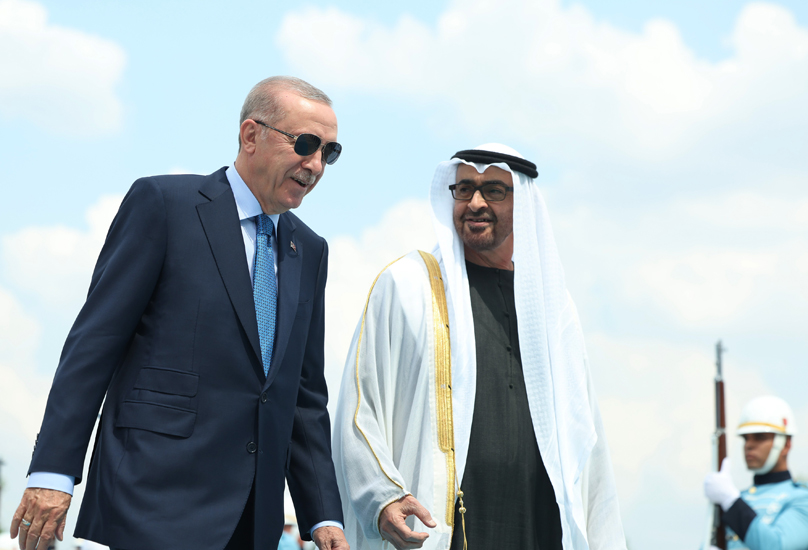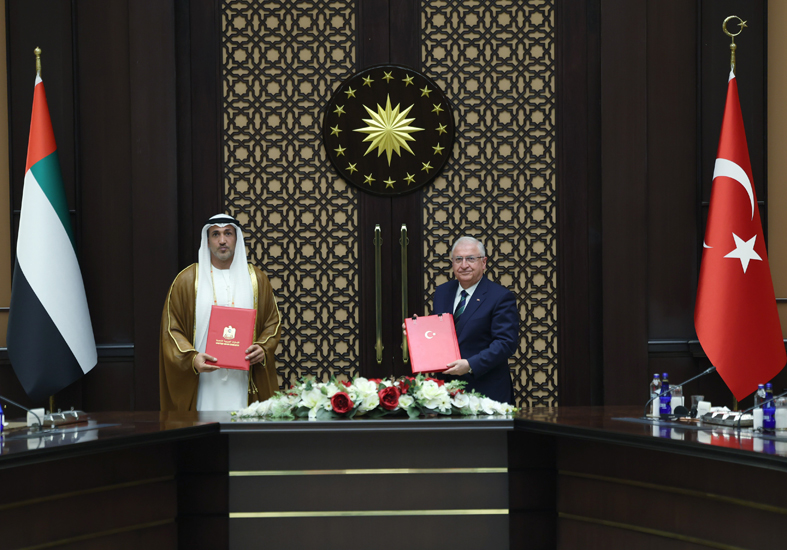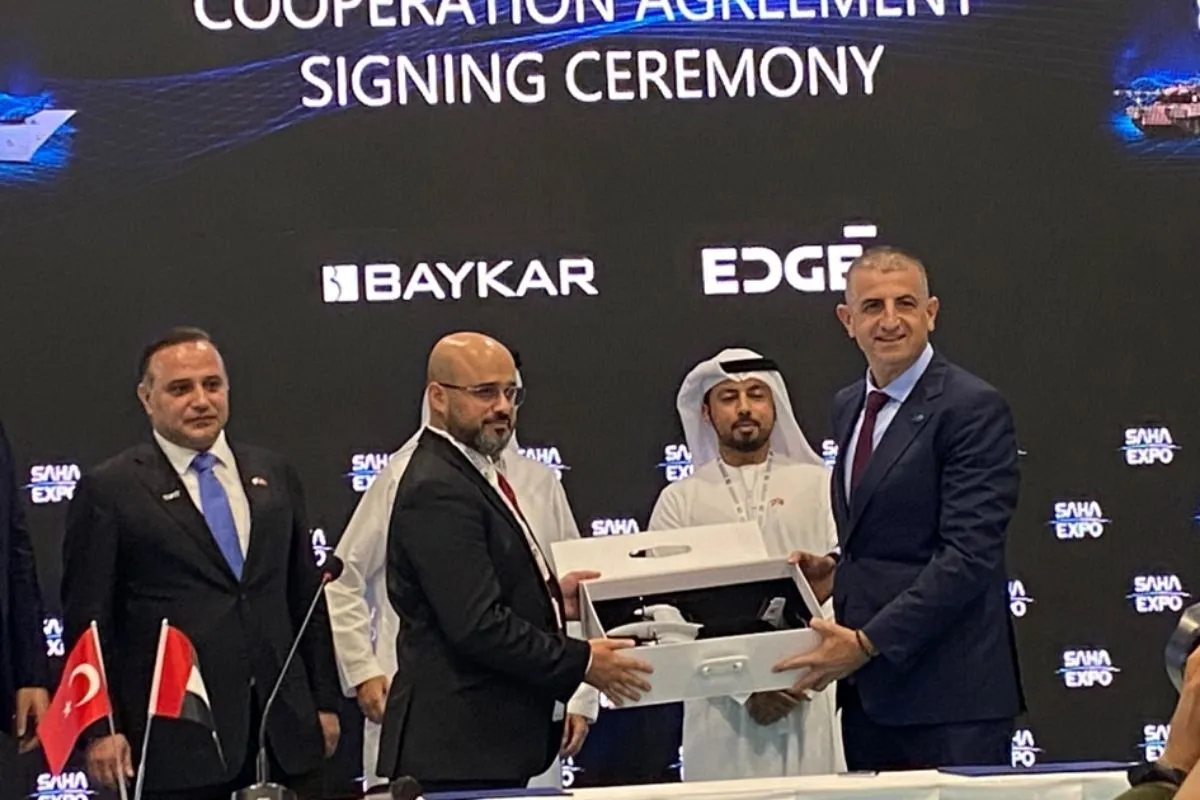Levent Kenez/Stockholm
Turkey and the United Arab Emirates (UAE) have signed a bilateral agreement to protect classified information in defense industry cooperation, paving the way for closer joint military projects.
The agreement, officially titled “Agreement on Mutual Protection of Classified Information in the Field of Defence Industry,” defines procedures for securing classified information exchanged or generated through joint defense projects. It covers issues such as access control and the transmission, destruction and protection of defense-related documents and materials. The deal aligns with similar agreements Turkey has recently signed with other countries to which it sold military drones in particular.
The deal was finalized in Ankara on July 16 by Turkish Defense Minister Yasar Güler and UAE Minister of State for Defense Affairs Mohammed bin Mubarak Al Mazrouei, during the visit to Turkey of UAE President Sheikh Mohammed bin Zayed Al Nahyan.

The text establishes common definitions and classifications for sensitive information including four standard levels — top secret, secret, confidential and restricted — with full mutual recognition of national equivalents. It also sets detailed rules for handling documents, securing personnel clearances and carrying out industrial contracts that involve sensitive content.
Both parties commit to ensuring that classified information will not be disclosed to unauthorized individuals or third parties and that it will be used strictly for the purpose for which it was shared. Under the terms of the agreement contractors and subcontractors participating in classified defense projects are required to meet specific security criteria defined by the national authorities of each country.
The agreement allows for the mutual recognition of facility and personnel security clearances. Any individual or institution seeking access to classified defense information must undergo national vetting and be formally approved by the competent security authority.
Information will be transmitted through diplomatic channels or via military attachés with additional protocols allowing for urgent hand delivery by authorized personnel. Copies or translations of documents marked confidential or higher require prior written permission from the originating party. Destruction of restricted materials must follow procedures designed to prevent partial or full reconstruction.
The legal framework ensures that all sensitive defense cooperation between the two nations operates under reciprocal protections and in line with their respective national legislations. The scope includes research and development, defense procurement system integration and co-production activities.

The signing comes at a time of rapidly improving relations between Ankara and Abu Dhabi. Diplomatic ties strained for nearly a decade due to regional political rivalries and opposing positions in conflicts such as Libya and Egypt reached a low point after a 2016 coup attempt in Turkey when Ankara accused the UAE of supporting anti-government groups. Efforts to restore relations began to gain momentum in late 2021 marked by high-level visits and followed by growing economic cooperation and defense dialogue.
Turkish President Recep Tayyip Erdogan’s isolation in the Islamic world played a significant role in the normalization of relations. The damage to Turkey’s image appearing to have conflicts with nearly every country in the region went beyond Erdogan’s personal interests. Meanwhile Turkey’s gradual economic decline and its increasing need for foreign capital have compelled a shift in policy.
Reciprocal visits by President Erdogan and UAE President Al Nahyan further solidified the process of normalization..
In 2022 the UAE pledged $10 billion in investments in Turkey targeting industries including defense, aviation and technology. Turkish defense contractors, particularly those involved with unmanned aerial systems, have attracted interest from Gulf states seeking to expand indigenous military capabilities and reduce dependence on traditional suppliers.
The agreement does not name specific systems, but it provides a legal foundation for expanding secure cooperation on sensitive platforms. Turkish companies such as Baykar, owned by Erdogan’s son-in-law and known for its Bayraktar TB2 drones, as well as state-owned Aselsan and TAI have already established themselves as key players in international defense markets including in the Middle East.
While the classified information agreement does not cover sales directly, it establishes essential conditions for enabling future industrial partnerships. This includes co-development projects, technical assistance and technology transfer programs involving sensitive content or dual-use systems.
The legal text also addresses intellectual property rights and data protection in cross-border cooperation. Classified contracts involving patented technologies or proprietary methods will be subject to reciprocal legal respect, and the use of personal data such as visitor information or contractor credentials must comply with national data protection rules.
The new legal framework between Turkey and the UAE is expected to facilitate joint programs, ensure secure exchange of technical specifications and enable a higher level of defense trade. Both countries are pursuing modernization in critical sectors such as air defense, naval platforms and cyber warfare systems where information sensitivity and regulatory compatibility are vital.

The latest agreement builds on a growing pattern of defense engagement between Turkey and the United Arab Emirates. In 2022 two memorandums of understanding were signed between Turkey’s Presidency of the Defense Industry and the UAE’s defense procurement authority, Tawazun, during a visit by Emirati defense industry officials. In 2024 Turkish Defense Minister Yasar Güler met with UAE Minister of State for Defense Affairs Al Mazrouei at the Saha Expo defense fair in Istanbul. Following their meeting at the Istanbul Expo Center, the two ministers signed a military cooperation framework agreement. Founded in 2019, the Edge Group — one of the UAE’s largest defense industry holdings — has expressed a strong interest in partnerships with Turkish companies as part of Abu Dhabi’s efforts to diversify its defense relationships and build domestic capability.












